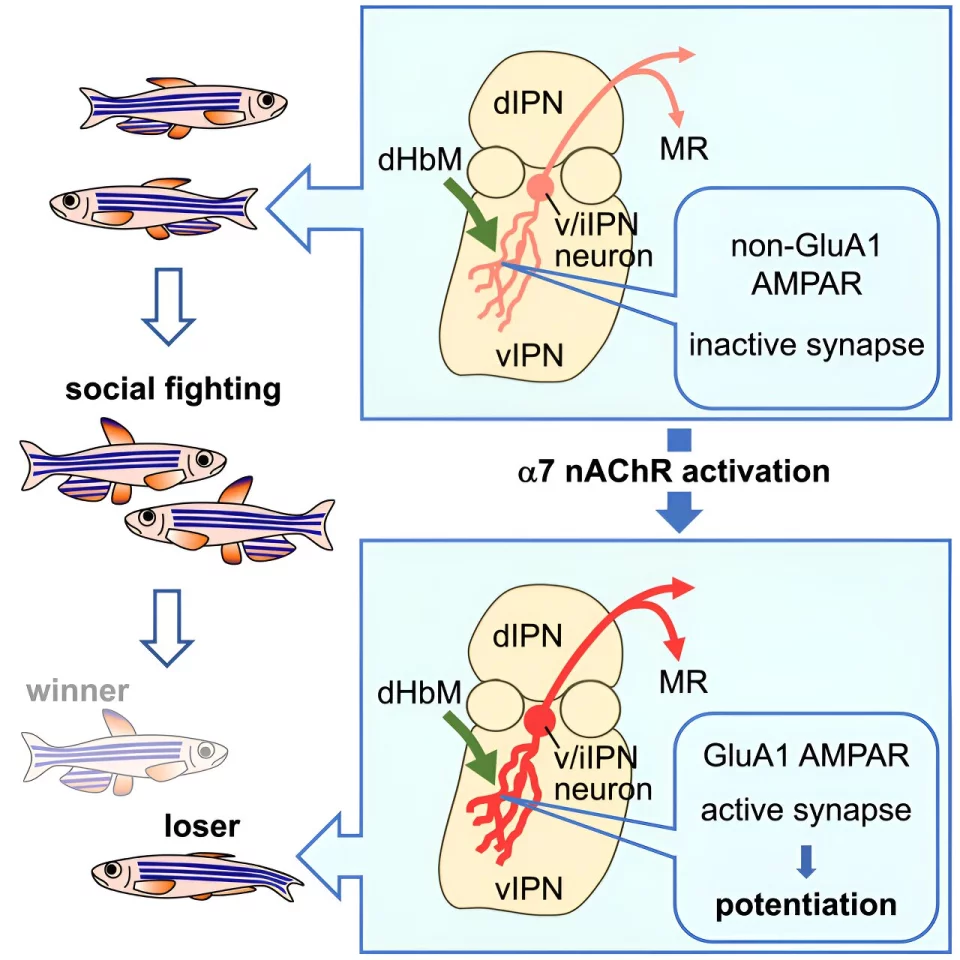Scientists have identified the molecular mechanism that causes a losing zebrafish to withdraw from a battle. While fighting fish in general may not spark a lot of interest, the fact that zebrafish and humans have very similar neurobiology means this discovery could be significant for treating mood disorders.
The scientists from the Japanese research institute Riken had previously found that the habenula, a deep brain structure, houses two neural circuits that play a crucial role in the zebrafish determining if it’s won or lost a fight.
Now, the puzzle of how this circuit was activated has been solved, with the team finding that, when a fish is in the grips of defeat, the neurotransmitter acetylcholine (ACh) flicks the neural switch that creates a loser-specific potentiation – or the strengthening of a signal along a pre-existing pathway – in the habenula-interpeduncular nucleus.
The process then also involves another neurotransmitter, glutamate, moving from the inside to the surface of the postsynaptic membrane of the neurons in the interpeduncular nucleus – something that did not occur in winners.
Essentially, this molecular activation that induces a very specific neural chain reaction signals to the fish that it’s time to cut and run, or swim.

Because zebrafish possess similar neurotransmitter receptors, transporters, and enzymes of synthesis and metabolism as humans and rodents, it’s likely this mechanism exists across species with similarly conserved brain makeup. The fish also share about 70 per cent of genes with humans, and 84 per cent of genes that we so far know are implicated in human diseases.
"This circuit from the habenula to the interpeduncular nucleus exists in all vertebrates," said Hitoshi Okamoto, who led the research team on the previous discovery. "So I'm quite confident that it plays a similar role in other animals."
The researchers made their discovery after putting two male zebrafish in a tank to fight. After there was a clear dominant fish, both were euthanized and their sliced brains were intensely studied.
So while, philosophically, perhaps neither fish was a winner at the end of the day, in the neuroscience world the difference was significant.
The researchers believe understanding this ‘loser switch’ could be hugely relevant in new treatments for mood disorders such as social anxiety and withdrawal.
"There's a lot of research implicating the habenula in severe depression, but the part of the habenula connected to the interpeduncular nucleus hasn't been studied very much," said Okamoto. "I'm sure that this circuit is probably involved in conditions such as social withdrawal."
While preliminary, the findings have interesting future considerations, such as could something that suppressed ACh activity have a positive effect on human drive, persistence and mental resilience?
In the meantime, the researchers intend to continue working out the roles that these winning and losing circuits play in survival.
"Our ultimate goal is to identify the real roles of these two circuits," said Okamoto. "Our current hypothesis is that the winner circuit makes fish focus on their internal state, whereas the loser circuit causes fish to look to the external world. We're currently performing experiments to test this hypothesis."
The study was published in the journal Current Biology.
Source: Riken






